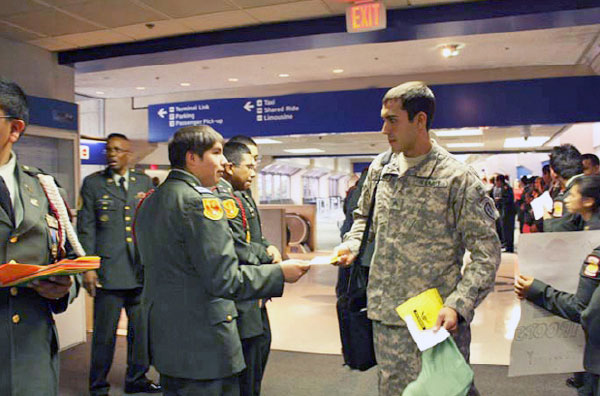At sunrise on December 18, 2011, the very last American convoy made its way down the main highway that connects Iraq and Kuwait. A series of heavily armored trucks and protected vehicles carrying about 500 soldiers steadily moved out of the combat zone. At about 8 a.m, the metal gate behind the last vehicles closed and with it, came an end to a deadly and divisive war that lasted almost nine years and cost the United States countless lives and billions of dollars. Senior Nauman Javed strongly opposed the war and said, “Any occupation that causes from lower estimates 300-500k civilian causalities is absolutely criminal.”
One of President Obama’s major campaign promises was to end the war in Iraq before his term was through, and he announced that he was carrying through on this promise, stating that every U.S. soldier would be out of Iraq in time for the holidays. Although both Americans and Iraqis alike are celebrating the removal of U.S. troops, the future looks uncertain for Iraq, with the Iraqi government already straining at the seams. Prime minister Nouri al-Maliki’s government seems to be teetering on the verge of collapse, and one of the main blocs of the Iraqi parliament is threatening to withdraw from the ruling coalition.
Many Iraqis, while happy that the American occupying force is leaving, also worry about the security of their country. Many saw the U.S. armed forces as being a mediating force between the various sects of the country – Sunni, Shi’ite, and Kurd – and the only force able to keep the peace. With these forces gone, some fear that the country will devolve into civil war.
The timeline for withdrawal of U.S. troops was actually arranged in 2008 by President George W. Bush, but was expected to be extended by future presidents as necessary. Indeed, President Obama’s administration was in negotiations with the Iraqi government in order to extend U.S. troop presence in Iraq past the 2011 deadline, but negotiations fell through over the legal immunity of troops in Iraq and as a result, troops had to be withdrawn before the end of the year or would face legal prosecution in Iraq.
Although all U.S. armed forces are leaving Iraq, the U.S presence in Iraq will continue through State Department employees and private security contractors. The goverment is planning fore the presence of between 15,000 and 16,000 federal employees and private contractors. The State Department will hire more than 5,000 private security contractors for armed details and has contracted with a private service to ferry U.S personnel in helicopters and planes. The State Department will command four major diplomatic centers and seven other facilities, a total of 11 sites around the country. The tab will be around $3.8 billion for the first year, far above the cost of any other diplomatic mission but lower than $40 billion in U.S. spending budgeted for fiscal 2011 in Iraq.
With the new mission, U.S. officials hope to redefine a strategic relationship that has rested for nearly nine years solely on war. The State Department will work Iraq’s centrla bankers, justice officials and agriculture experts, while trying to improve its police and armed forces.
The mission in Iraq was initially to find weapons of mass destructions in Iraq, destroy said weapons and to introduce regime change by deposing Saddam Hussein. When no WMD’s were found, the goal of the operation shifted to building a democratic institution in a country formerly ruled by a despot. This goal was met with resistance by Iraqi insurgents, who attacked U.S and Iraqi trained forces around the country. This insurgency was met with a “troop surge” that helped to improve security and reduce violence around the country. There have many low-level attacks since then, but the security situation has improved overall since the beginning of the war. Junior Nick Swann sees the war as being fought for the wrong reasons and said,”I think it ended too late because the point of keeping us over seas was to drain our funds and that seems to have worked well.
Many Americans though, remain divided over the withdrawal of U.S forces from Iraq. Some say that the troop presence should be extended indefinitely in order to maintain law and order in Iraq, while other see the war as a mistake in the first place and wanted troops out more immediately. While the war has divided American opinion and cost both blood and treasure, most Americans can agree that bringing troops home from danger to safety is the right thing to do. Sophomore Ishika Khondaker said,”Wars are terrible things and so a war could never end too soon.”



















